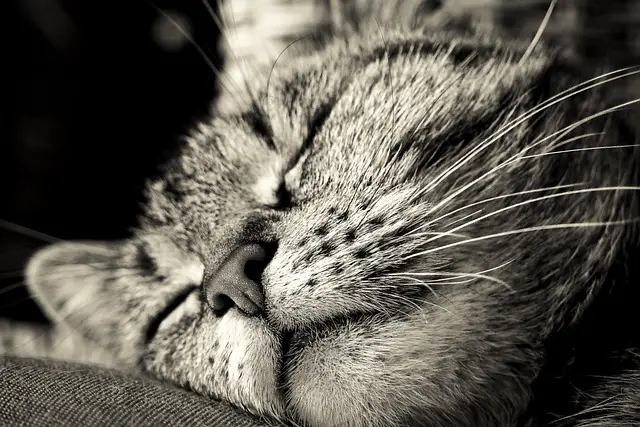We all know the feeling. You’re sitting on the couch, minding your own business, when your cat jumps into your lap and starts purring. Suddenly, your eyelids begin to feel heavy, and you can’t help but nod off. But have you ever wondered why cats have this effect on us? It turns out there’s a scientific reason behind it.
Do cats make you sleepy?
Cats have been known to have a calming effect on their human companions. In addition, studies have shown that merely stroking a cat can lower blood pressure and heart rate.
But why exactly do cats have this effect? One theory is that it has to do with their purring.
Purring is a low-frequency sound that has been shown to promote relaxation and reduce stress levels.
The vibrations from a cat’s purr may have a similar effect on the human nervous system, leading to feelings of calmness and drowsiness.
So if you’re feeling stressed out, spending some time with your feline friend may be just what you need to relax and rejuvenate.
The Power of Purring
When a cat purrs, they are vibrating its vocal cords at a frequency of 25-150 Hertz. This low frequency has been shown to promote healing, reduce stress, and lower blood pressure.
One study found that people diagnosed with hypertension (high blood pressure) had significantly lower blood pressure after spending time with a purring cat.
A no brainer
So it makes sense that this calming effect would also make us sleepy. After all, it’s harder to fall asleep when we’re stressed or anxious.
But falling asleep becomes much easier when we’re relaxed, and our blood pressure is lowered.
That’s why cats are such great bedtime companions!
Therefore, Are cats suitable for insomnia?
Insomnia is a sleep disorder that can make it hard to fall asleep, stay asleep, or both. As a result, people with insomnia often feel tired during the day and may have trouble concentrating, making decisions, or remembering things. Cats are good for insomnia for several reasons.
- First, they can help to lower stress levels. Studies have shown that spending time with a pet can reduce anxiety and promote relaxation.
- Secondly, cats can provide supportive companionship. For people who live alone, a cat can provide much-needed emotional support.
- Finally, cats can help to create a sense of routine. For example, a consistent bedtime routine is often recommended for people with insomnia, and having a cat can help to establish this routine.
In summary, cats can be helpful for people with insomnia in many ways.
Are cats good for mental issues?
There is no one-size-fits-all answer to this question, as the benefits of owning a cat depending on the individual’s mental health needs.
However, research has shown that cats can provide specific benefits for people with mental health issues such as anxiety and depression.
For example, stroking a cat has been shown to reduce stress levels and increase feelings of relaxation. In addition, cats require regular care and attention, which can help to structure your day and provide a sense of purpose.
Furthermore, watching a cat play can be a fun and entertaining way to take your mind off your problems. But ultimately, whether or not a cat is good for your mental health depends on your individual needs and preferences.
However, there is evidence suggesting that they can benefit some people.
Conclusion
There’s no doubt about it; cats have a way of making us feel sleepy. And while that might not be ideal if you’re trying to get work done during the day, it’s the perfect way to wind down before bedtime. So next time your cat jumps into your lap and starts purring, close your eyes and enjoy the ride!
[su_box title=”Affiliate Disclosure”]This website is supported by its readers. Please assume that all links are affiliate links. If you make a purchase from one of the links we will make a commission from Amazon. Thank you.[/su_box]




